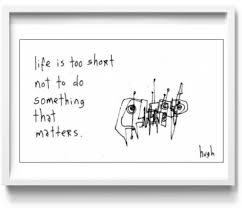A few weeks ago, I was at Bloomerang’s Bloomcon conference in Orlando, FL when an energetic fundraising coach/consultant walked up and introduced herself. Her name was Mazarine Treyz. Much was discussed and at the end of the day I walked away with two of her books.
As the weeks have passed, I’ve rapidly consumed Mazarine’s written thoughts on resource development and charting a career path in fundraising. To say that I’m impressed would be an understatement.
This week’s three blog posts will focus on Mazarine’s two books and an virtual online conference she is hosting.
 If you don’t own a copy of “Get The Job: Your Fundraising Career Empowerment Guide,” then I strongly suggest clicking over to Amazon and purchasing a copy of this book.
If you don’t own a copy of “Get The Job: Your Fundraising Career Empowerment Guide,” then I strongly suggest clicking over to Amazon and purchasing a copy of this book.
As I read this book, it dawned on me that everyone can benefit from Mazarine’s work:
- Individuals looking to break into the fundraising field
- Fundraising professionals looking to find work-life balance and fulfillment
- Employees looking to “manage up“
- Executive directors and board volunteers currently in a search process
To those who are interviewing
Mazarine breaks it down for you with practical and pointed advice on:
- Writing your cover letter and resume
- Interviewing
- Negotiating your salary and benefits
In these initial chapters, I really liked what she wrote about anticipating certain tricky interview questions and how to respond. One such question she tackles is, “Why do you want this job? How does this fit into your plans for life?” Sure this question seems simple, but as someone who has been tripped up by it, I really wish I would’ve read this book first.
What I liked even more than the chapter on interview questions was the section addressing what types of questions you should be asking of your interviewers at the end of the interview. Here are just a few gems:
- How much was raised last year, and how much would I be expected to raise in the first year?
- How many times has this position been filled in the last four years?
- What are some difficult decisions that need to be made? Staff cuts? Budgets? Funding cuts?
For the person currently looking for a position in fundraising, this book is pure GOLD!
To those searching for balance and success
Mazarine starts from Day One with a chapter on what your first 90-days should look like. She provides tips on how to be a better fundraising professional; how to manage your career path; and how to focus your efforts and balance competing demands on your time.
Perhaps, some of the best stuff in the book for individuals currently holding down a fundraising job are case studies (e.g. interviews with other successful non-profit professionals). There is more wisdom shared in that chapter than I can possibly describe.
Managing Up
Mazarine hits the nail on the head when she describes the day-and-the-life of a typical fundraising professional in a one-person development shop. In approximately 10-pages, she covers lots of ground including:
- Organizational culture
- Managing your boss (aka the executive director)
- Assessing what type of boss your work for
There are many things that go into making a top notch fundraising professional, but one thing I see in almost every single one is their ability to “manage up.” Lots has been written on this subject, but Mazarine digests it down very nicely.
Are you hiring?
If you are an executive director or board volunteer currently in the middle of a search process, Mazarine’s book can act like a mirror. It can help you better understand the candidates with whom you are meeting. It can help you craft better interview questions and anticipate what good candidates will say in response to those questions. It will help you know what questions those interviewees may ask of you.
It may even make you a better employer.
 Learn more about Mazarine Treyz
Learn more about Mazarine Treyz
If you can’t tell, I’ve quickly become a fan of Mazarine Treyz. She is one of the more genuine people who I’ve met in my travels, and I’ve quickly become a fan. Like me, Mazarine is a blogger and you can learn a lot about her by visiting her blog and sifting through her posts. You can find her at Wild Woman Fundraising. But if you do nothing else, you should go buy a copy of this book. I promise that you won’t regret it!

 When I graduated college with my masters degree in Urban Planning in 1994, our country was still emerging from a small recession (you know the once that propelled Bill Clinton into the White House). Needless to say, government jobs in urban planning offices across America were still in short supply, and there were many people with much more experience waiting in line for jobs ahead of me. It was this economic dynamic that forced me to innovate, changing my job search parameters and propelling me into the non-profit sector.
When I graduated college with my masters degree in Urban Planning in 1994, our country was still emerging from a small recession (you know the once that propelled Bill Clinton into the White House). Needless to say, government jobs in urban planning offices across America were still in short supply, and there were many people with much more experience waiting in line for jobs ahead of me. It was this economic dynamic that forced me to innovate, changing my job search parameters and propelling me into the non-profit sector. I loved working for the Boy Scouts because I learned so much including:
I loved working for the Boy Scouts because I learned so much including: Look into your heart and understand your passions
Look into your heart and understand your passions